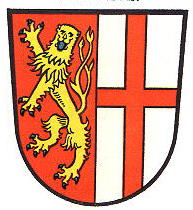Vallendar: Difference between revisions
Knorrepoes (talk | contribs) m (Text replacement - "50 pxCategory:Rheinland-Pfalz" to "Category:Rheinland-Pfalz") |
Knorrepoes (talk | contribs) m (Text replacement - "===Official blazon=== *(de) " to "{| class="wikitable" |+Official blazon |- |'''German''' | ") |
||
| Line 9: | Line 9: | ||
[[File:vallenda.jpg|center|Wappen von {{PAGENAME}}]] | [[File:vallenda.jpg|center|Wappen von {{PAGENAME}}]] | ||
= | {| class="wikitable" | ||
|+Official blazon | |||
|- | |||
|'''German''' | |||
| | |||
===Origin/meaning=== | ===Origin/meaning=== | ||
Revision as of 09:50, 5 July 2022
This page is part of the German heraldry portal Deutsche Wappensammlung |
Heraldry of the World |
|
German heraldry:
|
Selected collector's items from Germany:
|
VALLENDAR
State : Rheinland-Pfalz
District (Kreis) : Mayen-Koblenz (until 1970 Koblenz)
Verbandsgemeinde : Verbandsgemeinde Vallendar
| German |
Origin/meaningThe town was ruled in medieval times by both the Archbishops of Trier and the Counts of Sayn. The cross of Trier and the lion of Sayn both appear on separate 14th century seals of the city, with St, Marcellinus and St. Peter, the patron saints, as supporters. In 1681 Trier acquired the whole area and until the early 20th century only the cross was used in the seals. The present arms were granted in 1909 and combine for the first time the lion and the cross in a single shield. Hupp showed the arms as used before 1909, showing the cross, the lion, a chalice and in the first quarter a cross and a palmyre:
Contact and SupportPartners: Your logo here ?
© since 1995, Heraldry of the World, Ralf Hartemink Literature : Stadler, 1964-1971, 8 volumes; Hupp, O: Kaffee Hag albums, 1920s |














